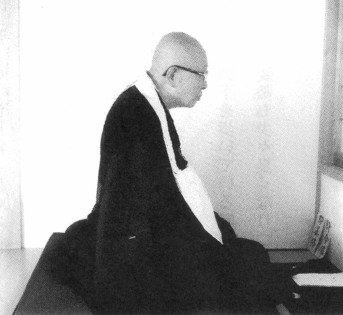
Adult practice: Part 48
|
Let us take a short break from studying the details of a Japanese Soto-shu monk's career. I would like to quote from a newsletter that just arrived from Itabashi Zenji's temple, Gotanjoji. Gotanjoji is one of thirty-something official Soto training monasteries, and Itabashi is only one of (I think) three living persons who have the title of zenji. Zenji literally means "zen master". There are some who say that there is no such thing as a Zen master (because you do not master Zen), others claim that Dharma transmission or Inka or whatever document they picked up un their spiritual travels qualifies them as an officially acknowledged Zen master. Others try to combine both claims and say: There are no Zen masters, but if there are, than I am one!
Anyway, Itabashi Zenji writes in his newsletter:
"I always had a bad posture since I was young. I am stooping a little, with my head hanging forward. I tried to FIX that for a long time. But nothing seems to help. So I thought that maybe I inherited from my mother, "it must be in the genes", I said.
Especially my posture during zazen is bad. ... I also do a lot of inemuri during zazen. Also, maybe because of my bad posture, I have a lot of random thoughts and delusions rising up during zazen without end.

... Several times I asked the monk who walks around with the kyosaku stick to correct my posture and wake me up from INEMURI by beating me really hard. But for some reason he ignores this old monk. And not only that: One of the monks even took a picture of my inemuri zazen and presented it to me!
Already 60 years have passed since I started zazen as astudent in Sendai. I had almost given up hope, thinking to myself: "Now look at what kind of monk you became!"
But recently, I had a good idea! I started to put a small cushion on my head during zazen. And it had the result I was hoping for: Whenever i start to do inemuri, the cushion drops from my head and I wake up. It sometimes happens that the cushions drops ten times during one period of zazen. Especially during the second period in the morning.

Also, since I started putting that cushion on my head, my posture has improved so much that I can realize it myself. My spine seems to be erect, directly connecting my sitting bone to the top of the skull. My hips are rooted, and I naturally start to breath from the abdomen..."
I think there are lots of things we can learn from this newsletter. About the humbleness of a true Zen master, for example. But also about the meaning of zazen kufu, one of the two aspects of Zen practice that Dogen Zenji mentions at the end of the Gakudoyojinshu (the other aspect is sanshi monpo, i.e. to meet with a teacher and ask about the dharma). Zazen kufu means to try one's best at zazen. "trying one's best" here implies experimenting, trying various ways, giving one's all, never giving up.
I commented about the problem of inemuri zazen in the past. Also here at Antaiji, sleeping during zazen is a big problem for some of the monks. It seems to be a greater problem for the Japanese part of the sangha, but westerners also sometimes sleep during zazen (usually it is the Westerners though who say: "I can not concentrate on my zazen because my neighbor sleeps all the time"). My own experience with this can be found in the "adult practice" series, starting with part 7 (continuing until part 12). About the difefrence of the Japanese physical experience of zazen in comparison to that of a Westerner, see part22.
Still, I never saw anyone do the kind of kufu Itabashi Zenji does in his old age. Respect!
This is all for this autumn, but below you find four essays by Brendan, who has been living here since June.
| <<< Previous chapter | Contents | Next chapter >>> |
